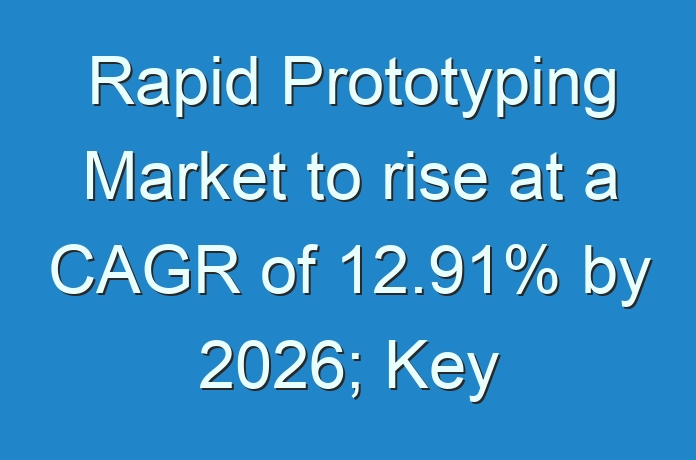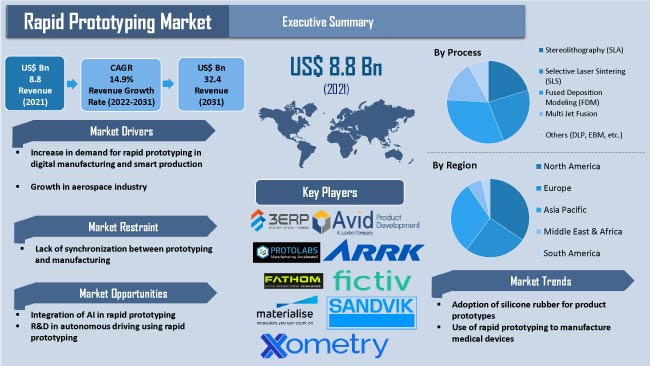
According to a new market report published by Transparency Market Research titled “Rapid Prototyping Market – Global Industry Analysis, Size, Share, Growth, Trends, and Forecast, 2018 – 2026,” the global rapid prototyping market is expected to reach US$ 6,513.9 Mn by 2026. The market is projected to expand at a CAGR of 12.91% during the forecast period from 2018 to 2026. According to the report, the global rapid prototyping market will continue to be influenced by a range of factors such as rising demand for 3D printing technology worldwide, and increasing demand for rapid prototyping to speed-up the design and production process. Asia Pacific will continue to be at the forefront of global demand, with the market in the region growing at above 14% through 2026.
Want to know the obstructions to your company’s growth in future? Request a brochure @ https://www.transparencymarketresearch.com/sample/sample.php?flag=S&rep_id=16796

Metal as a material used for rapid prototyping expected to be more lucrative for the market
The global rapid prototyping market is bifurcated by components into metal, polymer, ceramic, plastic & starch, and foundry sand parts. Metal is expected to surpass US$ 1,700.00 Mn by 2026. Metal type material is extensively used for rapid prototyping across heavy load industry verticals such as automotive and aerospace & defense. Additionally, metal also finds application across industry verticals such as healthcare, for rapid prototyping of medical equipment such as implants, surgical instruments, and more.
Additive rapid prototyping technology expected to dominate the rapid prototyping market around the globe
Based on technology, the rapid prototyping market is segmented into subtractive and additive. Additive rapid prototyping technology is projected to surpass US$ 3,000 Mn by 2026. As compared to subtractive rapid prototyping technology, additive rapid prototyping technology offers prototyping of any part at a much faster speed that helps in ramping up the designing and production process. Furthermore, subtractive prototyping is limited to relatively simple shapes, while additive manufacturing can create complex geometries that are not possible with any other technology.
Consumer goods &electronics end-use industry segment expected to expand at a significant growth rate during the forecast period
On the basis of end-use industry, the rapid prototyping market is segmented into aerospace & defense, consumer goods & electronics, automotive, healthcare, and others. Others industry vertical segment includes entertainment and oil & gas. Rapid prototyping is being used largely by the consumer goods & electronics industry vertical, as time to market is vital for consumer products. Rapid prototyping plays a vital role in reducing the time to market alongside maintaining the quality. Unlike traditional prototyping techniques, rapid prototyping is a process where the part is built from the ground up, layer by layer, based on data from a CAD file. Furthermore, rapid prototyping helps in achieving higher designing and production speed that eventually reduces the time to market.
Looking for exclusive market insights from business experts? Request a Custom Report
North America to continue to hold significant share in the overall market
In terms of value, North America was the leading contributor to the global rapid prototyping market in 2017. The contribution is primarily due to the booming rapid prototyping marketplace along with the presence of well-established players across the region, especially driven by the U.S. and Canada. The U.S. is home to many well-established players from the rapid prototyping domain including 3D Systems, Inc., Stratasys Ltd., and Carpenter Technology Corporation. Furthermore, North America is witnessing higher adoption of rapid prototyping due to continuously rising automotive and healthcare industry. Many companies are trying to innovate novel products pertaining to rapid prototyping to compete with the other well-established players across the region and globe. For instance, in April 2018, Stratasys Ltd. advanced its products, namely J750 and J735 3D printers, to reduce the time-to-market and development cycles. Furthermore, it will help customers and various designers to build rapid prototypes with streamlined design-to-prototype workflows for faster time-to-market.
Stratasys Ltd., 3D Systems, Inc., GE Additive,Carpenter Technology Corporation, and Sandvik AB among others are some of the major players operating in the rapid prototyping market profiled in this study. Details such as financials, SWOT analysis, business strategies, recent developments, and other such strategic information pertaining to these players have been duly provided as part of company profiling. Various players are providing novel rapid prototypingto be used across various industry verticals to reduce the time to market. Also, market players are establishing partnershipsto support the growth of consumer demand.
Read Our Trending Press Release Below: https://www.prnewswire.com/news-releases/global-flexographic-printing-machine-market-to-support-businesses-to-stay-ahead-of-the-rivals-transparency-market-research-301012350.html





